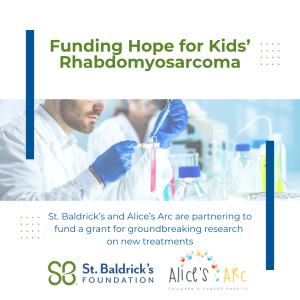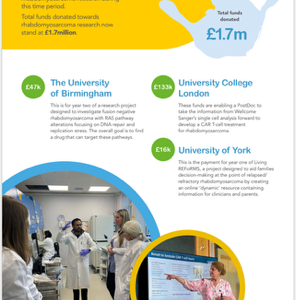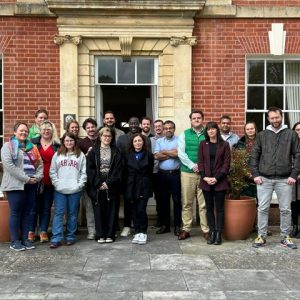This four-year project will be led by a team at the Institute of Cancer Research in the UK. Professor Janet Shipley and Dr Alejandra Bruna will lead the work in collaboration with Professor Trevor Graham, Director of the Centre for Evolution and Cancer. The team will investigate how chameleon-like rhabdomyosarcoma cancer cells can transform without undergoing any genetic changes. To help understand more about this process, click here to watch a short video.
The team is developing an innovative technology to do this – Plasticity Molecular Recorder. This will identify how these cells develop, interact with other cells and adapt as the tumour changes over time. The goal is that this new understanding will lead to new potential treatment options. Please read full details here
This project is the largest grant awarded by Alice’s Arc so far. The research lends itself beautifully to one of our strategic goals of devising new treatment options with emphasis on relapsed rhabdomyosarcoma. We have only been able to commit to an ambitious grant such as this through the phenomenal family support of the charity. Together we have made pioneering research a reality and perhaps one day a family won’t be faced with such a dismal prognosis.
Alice’s Arc co-founder, Sara Wakeling said: “The prognosis for relapsed rhabdomyosarcoma is dismal, with around an 8-20% chance of survival. Current treatments on offer don’t work well enough.
“In our view, not enough research has been done to understand the biological mechanisms that lead to relapsed rhabdomyosarcoma, and progress over the last few decades has stalled. Too many families have to face the impossible situation of watching their child deteriorate with no potentially curative treatment options available. This urgently needs to change.
“We are ambitious as a charity, and we want to be at the forefront of research. Discovering more about the biological mechanisms that drive this disease creates a sense of hope for families. Alice’s Arc is delighted to be funding this project.”
Professor Janet Shipley: “Understanding the differences that can be seen between rhabdomyosarcoma cells and the dynamic way that changes may lead to relapse has been a problem that has kept me awake at night wondering how to tackle. “I now feel that the stars have aligned – by using this new bespoke recorder system together with new laboratory models that better represent rhabdomyosarcoma at relapse, and recent advances which allow us to molecularly profile and trace single cells, we are in a strong position to examine this problem – and a step closer to discovering potential new treatment options. “However, this has only become a reality for us to explore thanks to the efforts and generosity of Sara and David and the supporters of Alice’s Arc. Together we hope to make a step-change difference in the way to tackle relapse of rhabdomyosarcoma.”
#togetherwearestronger #thearcs #rhabdomyosarcoma





